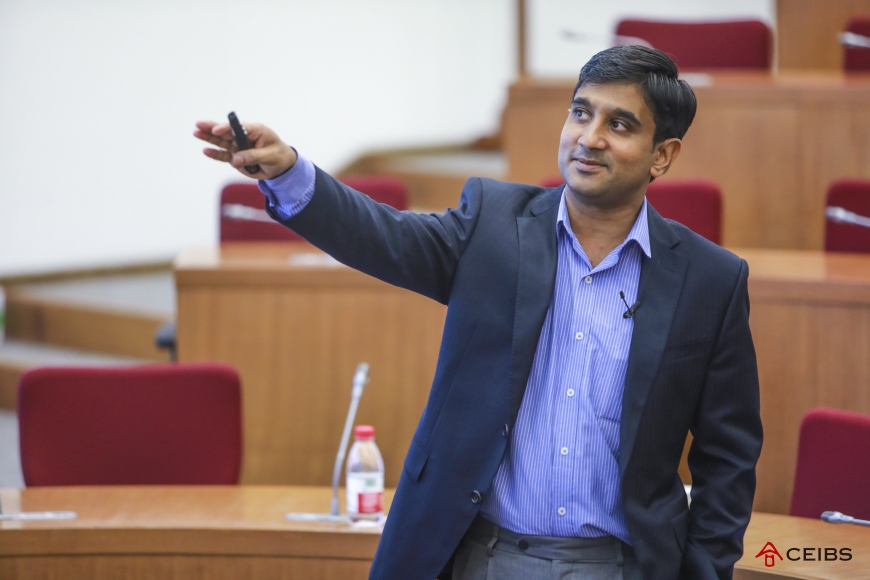Building a More Prosperous, Peaceful and Sustainable Planet

Shameen Prashantham
Associate Professor of International Business and Strategy
I first connected with CEIBS through one of my research collaborators, George Yip. Early in my academic career, I had worked on a research project in the UK as a postdoctoral researcher with George when he was at London Business School. Later, when I moved to Ningbo to teach at the University of Nottingham’s China campus, we stayed in touch, and connected with other CEIBS professors in the strategy and entrepreneurship department, including Klaus Meyer, who I also knew from the UK. These colleagues encouraged me to apply to CEIBS for a faculty position, and eventually I moved to Shanghai in July 2015.
There are many memories that I associate with CEIBS, but perhaps the most unique ones are from my visits to the school’s international campuses in Africa (Ghana) and Europe (Switzerland) to teach the Global Executive MBA (GEMBA) programme. In Ghana, I found a country that has a lot of hunger for self-development and entrepreneurial opportunity. In Switzerland, I experienced a focus on patient capitalism and long-term thinking. In both places, my GEMBA students came from all over the globe, and had a common interest in understanding better how China relates to the world and the world to China. My GEMBA teaching on three continents (which also includes the Shanghai campus) has given me the pleasure of engaging with highly experienced executives in the classroom, leading them on stimulating company visits and having fun at after-class social events in a truly global setting.

Teaching and researching in the diverse business environments of China, Ghana and Switzerland is a dream come true for me as an international business academic focusing on entrepreneurship. CEIBS aided my professional growth by providing me with resources to engage in and disseminate scholarly yet practically relevant research on my topic of “dancing with gorillas” – partnerships between corporations and start-ups. Also, CEIBS has a strong marketing and communications department who have helped me reach a wider audience, both in China, for example through WeChat posts, and overseas, for example by placing my articles in credible outlets like the Economist Intelligence Unit.
The biggest difference between my time at CEIBS and other past experiences has been the wonderful platform to seamlessly bridge academia and practice that the school provides. I have been fortunate to have previously worked at some fine British universities with scholarly departments ranging from archaeology to zoology. CEIBS, by contrast, is a world class standalone business school in the world’s most important emerging economy – and is relentlessly focused on engaging with the “real world” of managers and entrepreneurs. Working at CEIBS has expanded my horizons by giving me the opportunity to teach executives, engage in practitioner forums and explore more deeply China-related issues in my research and teaching. A unique example of the last-mentioned point has been applying the CEIBS Real Situation Learning Method (RSLM) to an elective on the globalisation of Chinese companies in Nanjing for CEIBS’ international MBA students.

Looking ahead, it seems to me that CEIBS has had the good fortune of growing tremendously in the first 25 years of its existence, creating an important legacy of equipping managers in China, as well as producing an elite alumni network that would be the envy of most business schools anywhere in the world. I see three aspects where the school should (and I am sure will) continue to strive for excellence. First, by ensuring local and global relevance: as China’s economy continues to grow, the school should retain its unique ability to straddle the Chinese and global stages, and meaningfully leverage its overseas campuses. Second, by maintaining the balance between academic rigor and practical relevance – which it has done very well until now – by continuing to value different types of academic work done by its faculty. Third, by integrating social impact with economic success. When people think of CEIBS, they often think of “China depth” and “global breadth”. But, we shouldn’t forget a third element: “responsible leaders”. One way to ensure we develop responsible leaders is foster greater sensitivity among scholars and students to the United Nations’ Sustainable Development Goals (2015-2030). When CEIBS celebrates its 50th anniversary, it would be marvellous if the school could look back on having played its part in helping China and the world to build a more prosperous, peaceful and sustainable planet.
Dr. Shameen Prashantham is an Associate Professor of International Business and Strategy at CEIBS. His research and teaching interests relate to international entrepreneurship and strategy. His research focuses on new venture internationalisation and, in particular, how start-ups “dance with gorillas” (i.e. partner with large multinationals as a means to improve their prospects of innovation and international expansion).














